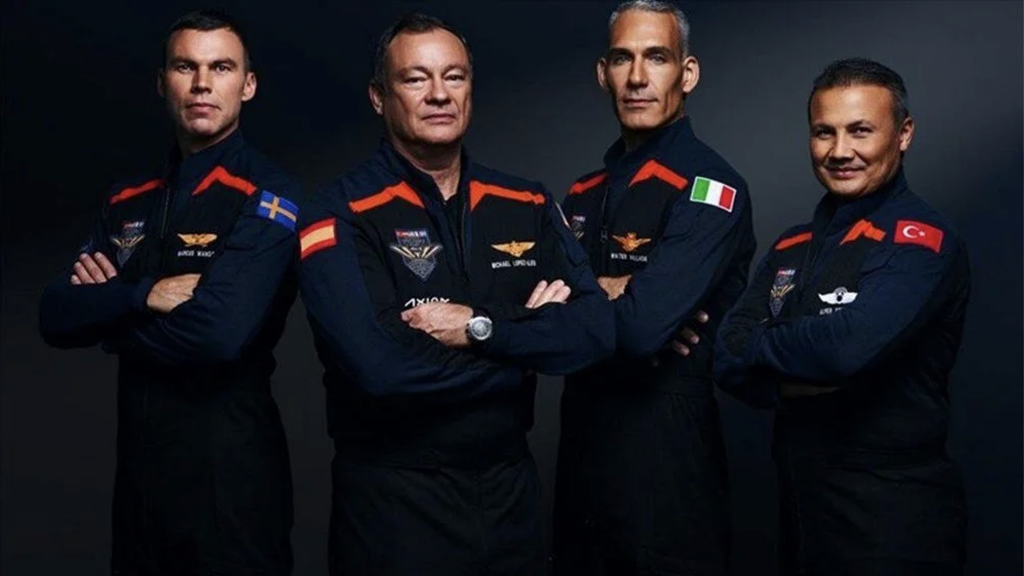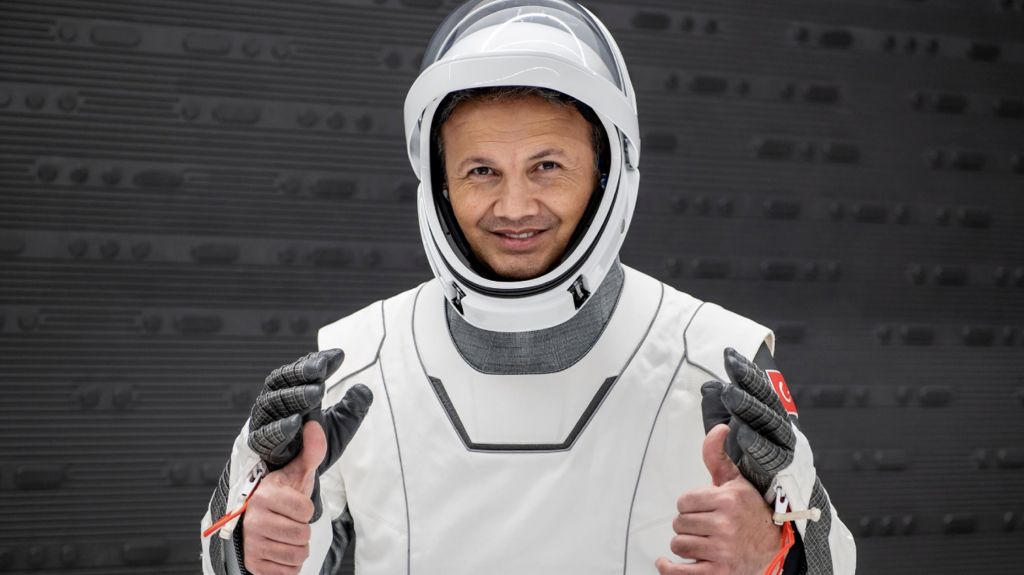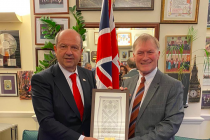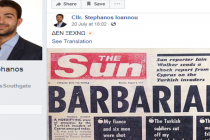Astronaut Alper Gezeravcı made history this week, becoming the first Turk to fly to space. The 44-year-old Silifke-born military pilot blasted off in a SpaceX Crew Dragon capsule atop a Falcon 9 rocket from NASA’s Kennedy Space Center in Cape Canaveral with three other crew members from Europe on Thursday, 18 January 2024.
The men are part of a commercially arranged mission by Texas start-up Axiom Space, docking at the International Space Station (ISS) on Saturday, 36 hours after launch. The ISS will be the crew’s home for the next 14 days as they carry out orbital research above the Earth.
The flawless rocket launch on Thursday took place an hour before sunset and was shown live on an Axiom-SpaceX joint webcast.
Cameras inside the vessel showed the four men decked in white-and-black helmets space suits and boots strapped into seats in their pressurised cabin. They looked calm as the rocket soared towards space.
Nine minutes after launch, the Falcon 9’s upper stage delivered the SpaceX Crew Dragon capsule to its preliminary orbit, where it continued its journey autonomously into space.
The rocket’s reusable lower stage detached itself from the rest of the spacecraft and flew back to Earth, safely touching down on a landing zone near the launch site.
Gezeravcı recites words of Mustafa Kemal Atatürk in space: “The future is in the skies”
Once in orbit, Gezeravcı’s first words to commemorate the historic occasion were in Turkish, quoting the visionary Turkish leader Mustafa Kemal Atatürk: “İstikbal göklerdedir” [The future is in the skies].
Talking into the receiver, alongside his fellow crew members on board the capsule in space, Gezeravcı said in Turkish:
“As the first Turk to take a step in space on Türkiye’s first manned space mission, I would like to mark this moment with the founder of the Republic of Turkiue, Mustafa Kemal Atatürk’s genius phrase: ‘The future is in the skies.'”
The former fighter pilot for the Turkish Air Force then switched to English to describe his feelings: “Starting from the end of the countdown all the way to here – a great ride. It has been a great feeling, as I have been dreaming of for so long … So, it’s been great so far.”
“I’m so privileged and honoured to be a part of this great team. Thank you so much, everybody, who has worked tremendously up until now for us to make it to this moment,” Gezeravcı continued.
Before the flight, Gezeravcı told reporters that during the Republic of Türkiye’s centenary year, the nation’s view of the sky had moved from what “we could see with our bare eyes,” to “this mission is opening that curtain all the way; This is the beginning of our next century.”
İlk Türk Astronot Alper Gezeravcı:
“İlk Türk’ün uzaya attığı şu anda, yüce atamızın şu sözüyle başlatmak istiyorum, istikbal göklerdedir.” pic.twitter.com/x0pbeXS1XU
— Mavi Savunma (@mavisavunma) January 19, 2024
His words were echoed by the Turkish President Recep Tayyip Erdoğan, who released a video message on Thursday congratulating the pilot and underlined his mission’s significance:
“We are taking a step into the second century of our republic, the Century of Türkiye, with the manned space mission we have undertaken for the first time,” President Erdoğan stated in the clip
“For the first time, we are sending a citizen into space to inspire our young people who look to the horizon with a sparkle in their eyes and our children whose dreams cannot be contained within the world.”
Thursday’s historic mission into space was one of the key goals for Türkiye’s National Space Programme, which was launched in 2021.
Fellow pioneer travellers
It is believed the company behind Axiom Mission 3 charges a minimum of $55 million for each astronaut’s place.
Two of Gezeravcı’s three colleagues on the ISS mission are also first-time space travellers.
Sweden’s Marcus Wandt, 43, is a fighter pilot and test pilot for Swedish Aeroplane Corp, who was chosen in 2022 as a reserve astronaut by the European Space Agency. Italian Air Force Col. Walter Villadei, 49, flew to the edge of space last summer with Virgin Galactic.

The three all brought tokens of their country into space: a Nobel Prize medal from Sweden, fusilli pasta from Italy, and items reflecting Türkiye’s nomadic culture.
Only Michael Lopez-Alegria has been in space before. The veteran Spanish American astronaut has launched into space four times with NASA, his first flight being as part of the STS-73 Space Shuttle programme in 1995.
The 65-year-old astronaut joined Axiom Space in 2017 as their Business Director and flew in space again in 2022 as commander of Axiom Mission 1, which was the first Axiom Space Crew Dragon mission to the International Space Station (ISS).
Orbital laboratory
Lopez-Alegria is also the commander of Axiom Mission 3. The quartet arrived at ISS in the early hours of Saturday morning, some 36 hours after leaving Earth, where they were greeted by seven members of the station’s current regular crew: two Americans from NASA, one astronaut each from Japan and Denmark, and three Russian cosmonauts.
The ISS (pictured below) is an orbiting laboratory that operates some 250 miles (400 km) above Earth. Gezeravcı and his Axiom-3 colleagues will spend a fortnight in microgravity aboard the ISS, conducting more than 30 scientific experiments, many of them focused on the effects of spaceflight on human health and disease.
Yusuf Kıraç, the president of the Turkish Space Agency (TUA), said Türkiye had been waiting for this for many years.
“Alper will hopefully successfully complete 13 scientific studies to pave the way for our country’s future endeavors,” Kıraç said.
“Today is a milestone for us, but it will continue. Our moon program, sending our people with our launch systems, is our main goal.”
TÜBITAK (Scientific and Technological Research Council of Türkiye) head Hasan Mandal also called it a historic day: “We are realising one of the missions that will leave a mark on history in the Century of Türkiye,” said Mandal.
Elon Musk’s SpaceX powers space missions
Axiom billed the flight as “the first all-European commercial astronaut mission” to the space station.
The company is an eight-year-old venture headed by NASA’s former ISS programme manager. It is one of a handful of companies building their own commercial space station to eventually replace the ISS, which NASA expects to retire around 2030.
SpaceX, the privately funded rocket and satellite company of billionaire Elon Musk, provides Axiom’s launch vehicles and crew capsules under contract, as it has for NASA missions to the ISS. SpaceX also runs mission control for its rocket launches from the company’s headquarters near Los Angeles.
Besides furnishing the launch site at Cape Canaveral, NASA assumes responsibility for the astronauts once they rendezvous with the space station.
The ISS was launched to orbit in 1998 and has been continuously occupied since 2000 under a U.S.-Russian-led partnership that includes Canada, Japan and 11 countries that belong to the European Space Agency.




